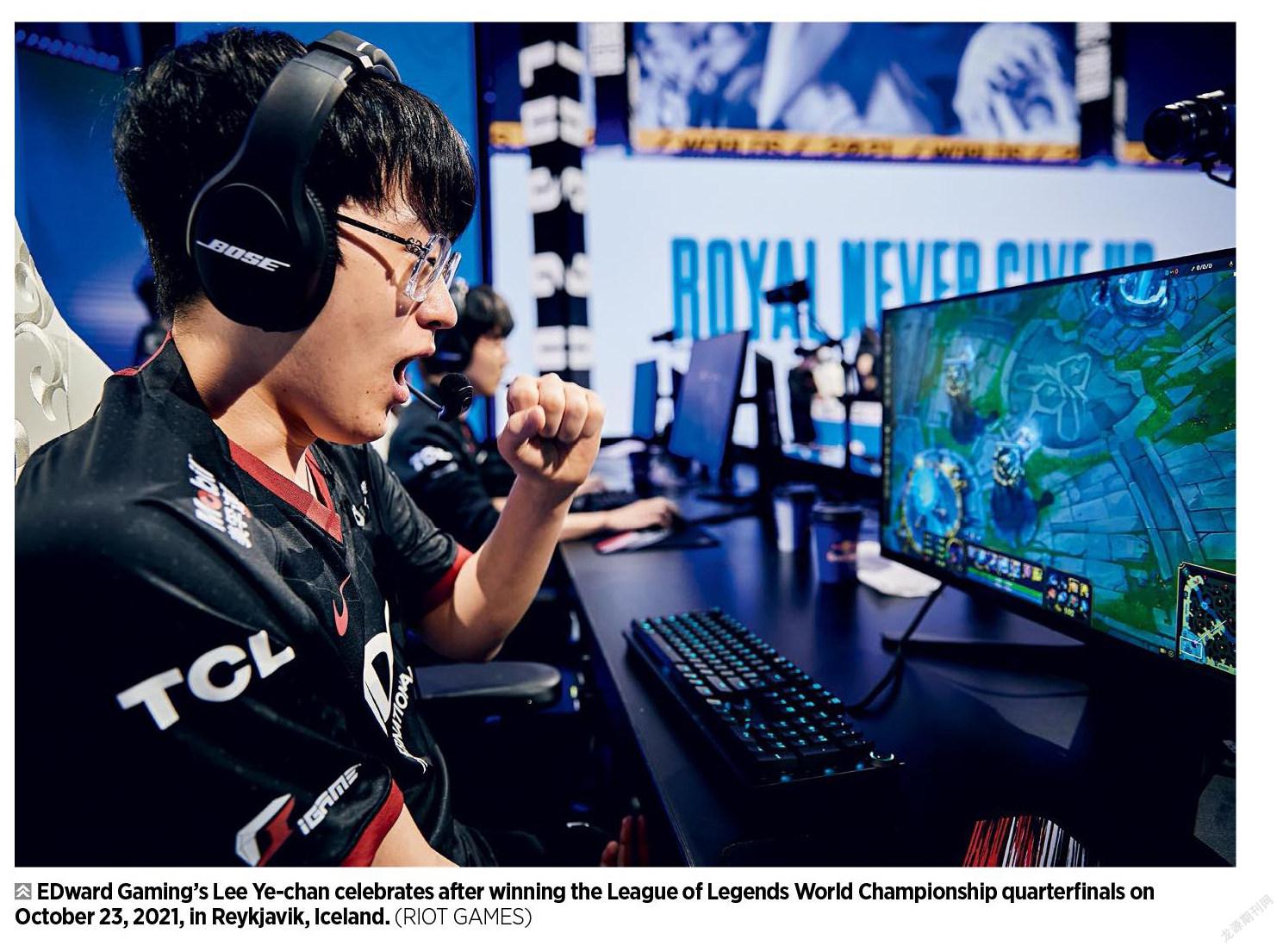CHINESE ESPORTS TEAM’S WORLDCHAMPIONSHIP TITLE IS HAILED BY FANS
2021-09-13ByYuanYuan
By Yuan Yuan

“It is a serious sport, just in an electronic way.”
The League of Legends World Championship finals tookplace on November 6, atiming welcomed by fans of the game, many of whomwork on weekdays. Whilelooking forward to the day,one such fan, Lin Weicang, said thechoice of day was considerate, eventhough Chinese fans would need tostay awake through the night due to the time difference as the game was held in Reykjavik, Iceland. They have anotherday to relax.“It will be a sleepless nightfor electronic sports fans in China,”the 27-year-old Beijing resident said in apost he shared on WeChat Moments.
Since Chinese esports team EDward Gaming (EDG) beat rivals GEN.G fromthe Republic of Korea (ROK) in thesemi-final on November 1, the finalbecame a big event for Chinese fans like Lin. A fan of the team for eight yearssince the EDG club was established in 2013, Lin has dreamed to see the teambecome number one in the world. Inprevious years, EDG did not progressbeyond the top eight to reach the semi- finals.
The situation was not expectedto be any better this year. Few fansbelieved EDG would reach the game,let alone stand a chance against lastyears champion, ROKs DWG KIA. Lindidnt want to think about the resultin the lead-up to the final. As theweather forecast predicted a rare coldwave would hit Beijing on the night ofNovember 6, Lin stocked up on enough snacks and beverages to get himthrough the night.
The intense battle between EDGand DWG KIA seemed interminable,but after four grueling hours EDGseemingly produced a miracle, winning 3:2 at approximately 1 a.m., Beijingtime, on November 7. Lin was thrilledto share their victory on WeChatMoments.“EDGwon!”he posted,receiving over 100 likes within the first minute.“At that moment, I realizedmany of my friends had also been gluedto the screen,”he said. He also noticedthat China Central Television (CCTV) released the news through its account on Chinas Twitter-like platform Weibo and within an hour, the post had been shared over 5 million times.
A Rugged Way
Photos of that night shared onsocial media show hundreds of fansout in the streets, crowding in frontof screens live-streaming the game in southern cities like Guangzhou, where the EDG club is based, and Shenzhenin Guangdong Province. Other photos captured the celebrations that lastedthroughout the night.
“It was the highlight moment ofChinas esports,”Linsaid.“It is not thefirst time for Chinas team to win world- level games, but this time, we felt more excited as the team turned the tables to defeat such a strong opponent.”
Li Xiaofeng, known popularly bythe name Sky, is the most renowned professional esports player in China.Li watched the whole game and posted a congratulatory message to EDG onWeibo.“Chinas esports teams rock!”he said.
Born in 1985, Li is regarded as theleading figure of the first generationof Chinas esports players. When hedecided to quit middle school to devote himself wholeheartedly to becoming a professional esports player in the late 1990s, he received nothing but strongopposition from his parents.“Societys attitude toward esports players in those days was very unfriendly,”Li said in aninterview with Xinhua News Agency. “They just thought I was one of thosebad boys that got addicted to computer games.”
After struggling to play games inlocal Internet cafes, Li decided to goto Beijing to seek more opportunities. At only 19, and with less than 100yuan (US$16) in his pocket, he left his hometown in Henan Province for the capital without telling his parents.He joined a small team at first, wentthrough harsh training of over 15hours a day and took part in manycompetitions, finally becoming a two- time champion at the World CyberGames.
In 2014, as a retired esports player, he set up his own esports club.“Today, the esports environment is more friendlyin China,”Li said. The success of thefirst-generation players has paved theway for the next batch of players. When Li Xuanjun, a member of the EDG team, wanted to quit middle school at the age of 14, he didnt receive much resistance from his mother and teachers, whoagreed to let him try gaming full-timefor one year on the condition that if he didnt make any progress, he wouldreturn to his studies.
Profession vs. Hobby
The story of the talented esportsplayers joining professional clubs intheir early teens maybe a thing of thepast after China released a rule onAugust 30 restricting players under 18 to no more than three hours of gaming per week.
The restrictions, which are thefirmest ever introduced, required allnational competitions to raise theminimum age for participation to 18and all professional clubs to dismissplayers under 18. Some in Chinasesports community fear this new rulewill hinder the discovery of esportsgeniuses at early ages.
“As a father of four, I can trulyunderstand the rationality of thispolicy,”said Nicholas Aaron Khoo, co-founder of Singapores Cybersports &Online Gaming Association.“Actually,many countries are observing andlearning what China is doing inthis respect [as game addictionhas become an increasing concernworldwide].”
The difference between a gamingaddict and professional esportsplayers, according to Khoo, is reallyabout how they plan and arrange theirtime. Professional players follow aplanned schedule and have a cleargoal of winning competitions, whilethe gaming addicts merely indulge inexcessive playing.
As of 2003, esports was recognizedas an official sport by the GeneralAdministration of Sports of China. In2016, it was further promoted as partof Chinas fitness and leisure industry. In the same year, the Ministry of Education made esports management an undergraduate university major. All these measures have created a boom in the niche. A report by Global Times revealed there were approximately 488 million gamers in China in 2020, and the industrys revenue skyrocketed from 94.73 billion yuan (US$14.8 billion) in 2019 to 136.56 billion yuan (US$21.4 billion) in 2020.
Li Xiaofeng suggests those avid gamers keep a cool head when making the decision to go pro. “Only one in a million can become a professional esports player,” he said. “Dont regard yourself as a talent just because you can achieve high scores in regular computer games.”
He suggested these players visit professional clubs to test whether it is the right area for them. "Even after youre enrolled in the clubs, the training is intense and bitter,” he added. “It demands a combination of multiple capabilities such as teamwork and learning abilities as you need to quickly adapt to different iterations of a game. It is a serious sport, just in an electronic way."
